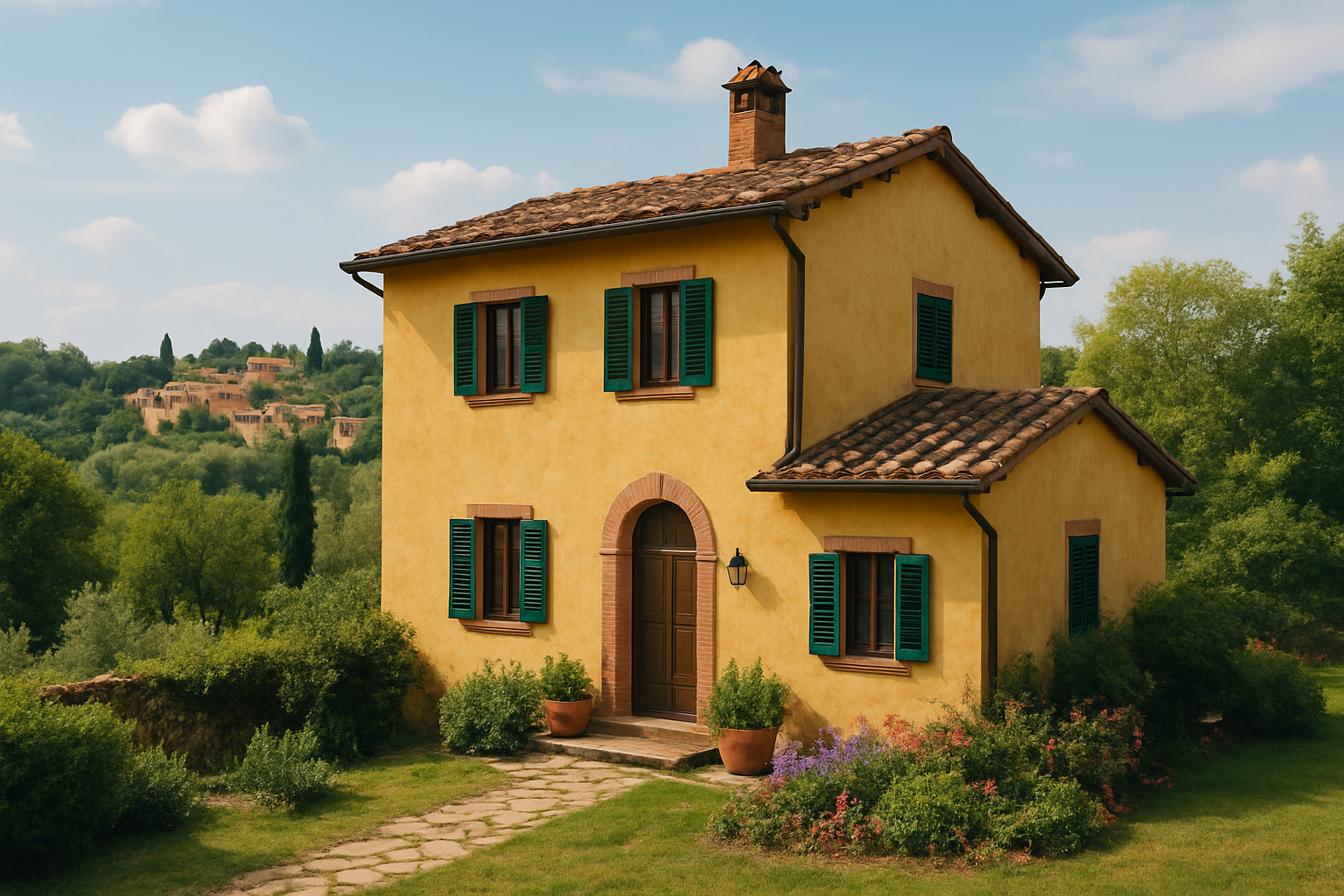Introduction
Italy draws a steady flow of expats from around the world. But moving to a new country is never just about packing and buying a ticket—the housing decision is central. Should you rent first while you figure things out, or jump in and buy a home? Which city or region fits your lifestyle best? What legal, tax, and administrative hurdles await you?
This article navigates all those questions. We’ll walk you through both the rental and buying route from the expat’s perspective, with up-to-date figures, concrete steps, and real examples. Our focus is helping you understand how to make things work in Italy, not just what might happen.
Because of legal and tax nuances, in many cases “it depends” is the answer. But by the end of this, you should have clarity—and a roadmap—for your move.
Moving to Italy: Legal Foundations for Expats
Before you start hunting for property, you need to ensure your legal basis for living in Italy is settled.
Visa and Entry
-
EU / EEA / Swiss nationals face fewer barriers: you generally have the right to move and live in Italy, though you must still register locally once you arrive.
-
Non-EU nationals need a visa before entry in many cases (for longer stays). Common options include work visas, self-employment or freelancer visas, student visas, or the elective residence visa (for retirees or people with sufficient passive income).
-
Beware: owning property in Italy does not automatically grant visa or residency rights — you still must apply for the proper legal permit. Taxes for Expats+1
Residency (Residenza) & Permit of Stay (Permesso di Soggiorno)
-
After arrival, non-EU nationals often must apply for a permesso di soggiorno (permit to stay) at the local immigration office (Questura).
-
Once legal status is sorted, you may register residenza (residence) at the local municipal office (Comune). Having residenza unlocks many rights: health care access, voting in local elections (for EU), local services, etc.
-
In many cases, you can claim residenza even while renting or owning property. But you’ll need proof of address, a lease or deed, and other documentation.
Getting your legal footing first is crucial: you can’t sign many contracts, open certain utilities, or fully engage in financial transactions without these.
Obtaining the Codice Fiscale & Opening Bank Accounts
One of the very first logistical steps is getting a Codice Fiscale (Italian tax identification code). You’ll need it for nearly everything: contracts, banking, taxes, utilities, property transactions, etc.
-
You can obtain it from the Agenzia delle Entrate (Revenue Agency), often by visiting a local office with your passport and visa/permit.
-
Some consulates abroad or Italian embassies may assist or issue it ahead of arrival.
-
Once you have a codice fiscale, you can more smoothly open a bank account, which is essential for handling payments, wiring funds, mortgages, and receiving rental income.
Without this, you’ll hit frequent roadblocks when engaging in bureaucracy.
Renting an Apartment in Italy: Overview
For many expats, renting is the prudent first step: less risk, more flexibility, and time to assess neighborhoods before committing. But the Italian rental market has its own grammar of contracts and norms.
Types of Lease Contracts
A few common types:
-
Contratto 3+2 (Standard residential lease): 3 years + automatic renewal for 2 more years (total 5), unless one party opts out. This is the typical long-term lease.
-
Contratto transitorio: a shorter lease (often 6 to 18 months), meant for temporary stays (e.g. work assignment).
-
Short-term / tourist leases: used when renting for weeks or months; different rules and sometimes subject to local tourist regulations.
-
Cedolare secca regime (optional flat tax): for landlords, to simplify taxation on rental income (avoid registration tax increases) — more on that in the tax section.
Rentals may be unfurnished, semi-furnished, or fully furnished. Especially in older buildings (common in Italy), you may find minimal furnishing or basic appliances; many tenants bring or negotiate appliances.
How to Search & Inspect Rental Property
Finding a good rental in Italy requires persistence and use of multiple channels.
Where to Search
-
Online property portals: Idealista, Casa.it, Immobiliare.it are among the most used in Italy.
-
Niche networks: Local Facebook groups, expat groups, notice boards.
-
Real estate agents (agenzie immobiliari): can help find listings and facilitate contracts, though they will charge fees.
-
Word of mouth / local contacts: especially in smaller towns, local networks often reveal unadvertised rentals.
-
Renters often note that in Italy listings move fast—especially in major cities—so readiness to act is key. Expatica+2Idealista+2
What to Inspect / Beware
-
Building condition and age: Many Italian buildings are old. Check plumbing, wiring, heating, insulation, mold, dampness.
-
Amenities: Elevator availability (many older buildings lack lifts), air conditioning (less common in some regions), parking, balconies, views, noise.
-
Heating & utilities: Know the heating type (gas, central, autonomous), who controls thermostat, and whether utilities are included or separate.
-
Is there a “certificato energetico” (energy performance certificate)? It may be required or helpful.
-
Lease conditions, restrictions, exit terms, maintenance responsibilities.
In short: photograph, ask, inspect thoroughly.
Signing a Lease: Steps, Documents & Costs
Once you find a suitable apartment, you’ll go through the formal lease (contratto) stage.
Documents Required
Typically landlords or agents will ask for:
-
Passport / ID
-
Visa or residence permit
-
Codice fiscale
-
Proof of income or financial means (pay slips, work contract, bank statements)
-
Guarantor (in some cases)
-
Possibly a reference from past landlord
Deposit & Advance Rent
-
It is common to pay 2–3 months’ rent as deposit (caparra).
-
Often the first month (or a few months) is paid upfront.
Agency Fees & Registration
-
If using a real estate agent, their commission is often one month’s rent plus VAT (or a proportional share) paid by the tenant.
-
The lease must be registered with the Italian tax office (Agenzia delle Entrate) within 30 days; there is a registration tax of 2% (1% to 3%) assessed on the rent value. For example: the registration tax is typically 2% of the total annual rent (split between landlord and tenant) with a minimum of about €67. Mercury Estate+2Expatica+2
Signing & Copies
-
The lease will usually be signed in duplicate (one for landlord, one for tenant).
-
Ensure the lease states all terms clearly: duration, rent, who pays which costs, rights on renewal or exit, etc.
-
Sometimes the lease is notarized (not mandatory for standard leases).
-
Once registration is completed, ensure you receive proof of registration.
Tenant Rights & Lease Security
Italy provides relatively strong protections for tenants.
-
Rent increases are regulated: within the contract term, the landlord cannot unilaterally raise rent.
-
Renewal rights: In a 3+2 lease, renewal is often automatic (unless notice is given within a defined period).
-
Eviction rules: Eviction of tenants is legally regulated and can take time.
-
Notice periods: Both landlord and tenant must give notice according to contract and law (often 6 months for landlord, 3 months for tenant).
-
Early exit: Sometimes allowed with penalty or notice as specified in contract.
-
Subletting or sharing: Contract must allow it explicitly if desired.
These protections give tenants some security, but contract details matter. Always review with a lawyer or local expert if possible.
Taxes & Fees for Renters
While many taxes fall on the landlord, you as a tenant should also be aware of:
-
Registration tax: As noted, the lease registration tax is often split between landlord and tenant, at 2% (or 1%–3%) of annual rent. Mercury Estate+2Expatica+2
-
Utilities and service charges (spese condominiali): Heating, water, cleaning common areas, lift maintenance, etc. Sometimes included in rent, sometimes separate.
-
TARI (waste tax): The municipal waste collection tax is often the tenant’s responsibility.
-
Electricity, gas, internet, water: Individual contracts with providers; setup fees may apply.
-
Local taxes or municipal service charges: May include small fees levied by the municipality for local services.
While renters avoid many of the burdens of ownership, budgeting for all of these is essential.
When It Makes Sense to Buy Instead
Buying often becomes compelling if you:
-
Plan to stay long-term (5–10+ years)
-
Want stability, control over property, or to avoid rental inflation
-
Wish to build equity or eventually pass a home to family
-
Are comfortable with the legal and tax complexity
However, buying means committing capital, assuming maintenance risks, and dealing with bureaucracy and costs. If uncertainty remains about where you’ll settle or for how long, renting may still be wiser initially.
Buying Property in Italy: Overview of the Process
Let’s walk through the main steps when buying:
-
Search & select a property: via agents, portals, local contacts.
-
Preliminary agreement (Compromesso / Contratto Preliminare): you sign a preliminary contract and pay a deposit (often 10–20 %).
-
Due diligence / investigations: verify cadastral records (catasto), land registry (conservatoria), building permits, liens, structural condition, zoning, utilities.
-
Notary choice: a notary (notaio) handles the formal deed (rogito). The buyer usually pays the notary and registration/tax expenses.
-
Final deed (Rogito notarile): final signing, funds transfer, registration, handing over keys.
-
Post-purchase formalities: register with the land registry, pay taxes, transfer utilities, etc.
The process usually takes 3 to 6 months or more, depending on complexity and local bureaucracy. Gate-away®+5Taxes for Expats+5Gate-away®+5
Choosing Between Primary Residence vs Second Home
A key decision: will this be your primary residence (prima casa / abitazione principale) or a second home / holiday / investment property? The choice dramatically affects tax rates and benefits.
-
If you choose it as your primary residence (and meet certain criteria, e.g. registering residency, not owning another property in same municipality), you may access “first-home” tax benefits: much lower registration tax (2% rather than 9%) and relief in cadastral/registry taxes. Idealista+5Idealista+5Experts for Expats+5
-
A second home (holiday or investment) is taxed at higher rates: registration tax 9%, higher property taxes (IMU), etc. Get Golden Visa+3Idealista+3Mercury Estate+3
Thus, if your intention is long-term living in that home, it often pays to structure things so it qualifies as your primary home.
Taxes, Duties & Closing Costs When Buying
When buying property in Italy, expect a variety of one-off and recurring costs. As a rule of thumb, additional costs (taxes, notary, agent, etc.) range from ~10% to 20% of the purchase price, depending on circumstances and property type. Mercury Estate+4Gate-away®+4italianrealestatelawyers.com+4
Here’s a breakdown:
Registration Tax, Cadastral & Mortgage Taxes (Acquisto da privato / secondhand property)
-
Registration tax (Imposta di registro):
-
For a “first home” (with conditions): 2% of the cadastral value (not necessarily the market price) Mercury Estate+3Idealista+3Experts for Expats+3
-
For second homes: 9% (in some sources sometimes 7%) of the cadastral value. Mercury Estate+3Idealista+3Giambronelaw+3
-
-
Fixed cadastral tax: €50 (or a small flat amount) Idealista+1
-
Fixed mortgage tax: €50 (in many cases) Idealista+1
-
Stamp duty (imposta di bollo), other small fixed fees.
VAT (if buying new / from a company)
If the seller is a construction company or a new building (less than 5 years since completion), the sale is often subject to VAT (IVA) instead of registration tax. Typical VAT rates:
-
4% for first homes under favorable conditions Mercury Estate+4Idealista+4Get Golden Visa+4
-
10% for “ordinary” new homes Mercury Estate+3Idealista+3Get Golden Visa+3
-
22% for luxury properties or top categories (A/1, A/8, A/9) Mercury Estate+3Idealista+3Get Golden Visa+3
Additionally, even when VAT applies, small registration, cadastral, and mortgage taxes often remain (flat fees). Get Golden Visa+3Idealista+3Mercury Estate+3
Agent Commission / Brokerage
-
Real estate agents typically charge 3% + VAT (22%) of the sale price (on both buyer and seller, unless negotiated otherwise). Mercury Estate+3Gate-away®+3Giambronelaw+3
-
Sometimes this is split, but often each party pays their own agent.
Notary Fees
-
The notaio is a public official who draws the deed, performs title checks, and handles registration.
-
Notary fees typically range 1% to 2.5% of the property price (or sometimes a sliding scale) Experts for Expats+4Giambronelaw+4italianrealestatelawyers.com+4
Other Costs & Due Diligence
-
Land registry searches, cadastral verification, obtaining building permits, surveys, structural inspections, environmental checks.
-
Legal fees (if you engage a lawyer) — advisable for foreign buyers.
-
Bank appraisal fees (if a mortgage).
-
Currency conversion / transfer costs if funds come from abroad.
All these together can push closing costs to 9%–15% for many buyers, and in some luxury or complex cases even toward 20%. Giambronelaw+3italianrealestatelawyers.com+3House for sale Tuscany+3
Financing & Mortgages for Expats
It is possible—but more challenging—for non-residents or expats to obtain a mortgage in Italy. Considerations include:
-
Down payment / equity requirement: Banks typically ask for 30% or more down payment (i.e., financing 70% or less) for non-residents. Mercury Estate+3Properstar+3Giambronelaw+3
-
Interest rates and terms: Rates may be higher for foreigners; terms may be shorter.
-
Documents required: Proof of income, tax returns, employment contract, bank statements.
-
Appraisal & valuation: The bank will appraise the property to ensure it is sound and the valuation is acceptable.
-
Currency risk: If your income or mortgage is in a foreign currency, fluctuations can matter.
-
Local banks vs international lenders: Often local Italian banks are used, sometimes with assistance from international branches.
If you can self-finance (i.e. pay cash or partial cash), that simplifies matters substantially.
Post-Purchase Obligations: Taxes & Running Costs
Owning a property in Italy brings ongoing costs and taxes you must factor in.
IMU (Imposta Municipale Unica)
-
The local property tax (IMU) is paid to the municipality twice a year (June and December). Berkshire Hathaway HomeServices+3Accounting Bolla+3The Italian Lawyer+3
-
Primary residences used by Italian residents are often exempt from IMU (unless luxury categories) Giambronelaw+3Mercury Estate+3The Italian Lawyer+3
-
But for non-residents, IMU generally applies even to houses that would be a primary residence if you were resident. Berkshire Hathaway HomeServices+3The Italian Lawyer+3Accounting Bolla+3
-
The rate depends on municipality and property classification (luxury, cadastral class).
TASI & TARI
-
TASI (Tributo per i Servizi Indivisibili): tax for municipal services (e.g. street lighting, maintenance). Often merged or levied alongside IMU by municipalities. Accounting Bolla+2The Italian Lawyer+2
-
TARI: the waste collection tax; generally always payable by the owner (or sometimes occupant) depending on local rules. Berkshire Hathaway HomeServices+2Giambronelaw+2
Maintenance, utilities, insurance
-
Regular repair, roof, façade, plumbing, electrical systems, structural maintenance.
-
Utilities: electricity, water, gas, internet, local service contracts.
-
Property insurance, and condominium (condominio) costs (common area maintenance, elevator, cleaning, etc.).
Rental Income Tax (if you lease the house)
If you decide to rent out (in part or wholly), you must declare rental income in Italy. You generally have two regimes:
-
Ordinary regime: rental income added to your global taxable income, taxed at your marginal rate (progressive).
-
Cedolare secca (flat regime): opt for a fixed rate (often 21% or 26%) on rental income (if conditions met), and in exchange avoid registration tax increases. Get Golden Visa+3Taxes for Expats+3Mercury Estate+3
-
Local deductions and expenses may apply (repairs, depreciation, property management, etc.).
-
The lease registration tax (2%) may also be applicable (see rental section). Mercury Estate+1
Capital Gains / Gains on Sale
-
If you sell your property within five years of purchase, capital gains may be taxed (for non-residents or residents, depending). After five years, in many cases, the gain is non-taxable. Mercury Estate+3GGI+3Giambronelaw+3
-
If the property has been your primary residence for most of the period, there might be exemptions.
-
Note: your home country may also tax capital gains—international tax treaties and double taxation relief may apply. GGI
Inheritance & Gift Tax
-
Italian rules for inheritance/gift apply. As a foreigner inheriting or receiving property, you may pay imposta sulle donazioni / imposta di successione, depending on value and relationship.
-
But Italy offers exemptions and lower rates for close relatives.
-
If you are on special tax regimes, there may be additional benefits.
Special Tax Regimes & Incentives
Italy has introduced several regimes to attract new residents, reduce tax burdens, and stimulate underpopulated regions.
Flat Tax / New Resident Regime (Res Non-Dom / 100K regime)
-
Foreign nationals relocating to Italy and who have not been tax residents for some years may qualify to pay a fixed €100,000 annual tax on foreign-source income, instead of full Italian progressive taxation. Nomad Capitalist+1
-
Also, Italy offers a “remunerative regime” for southern regions (Abruzzo, Basilicata, Calabria, Campania, Molise, Sardegna, Sicilia) where 90% of foreign income is exempt for 15 years. Nomad Capitalist
-
These regimes have eligibility criteria (minimum stay, not having been resident, etc.).
First Home Incentives & Concessions
-
For qualifying first homes, special lower registration tax (2%) instead of 9% on cadastral value. Mercury Estate+4Idealista+4Experts for Expats+4
-
Sometimes regional or municipal subsidies for energy upgrades or renovation.
These regimes can materially change the tax burden. Hiring a tax advisor who understands expatriate and international structuring is often worthwhile.
Best Cities & Regions for Expats
Choosing where to live is both emotional and practical. Below are some of the top regions and cities to consider, with pros and cons from an expat lens.
Rome (Roma)
-
Pros: Cultural capital, strong international services, many expats, good transport links, central in Italian politics and institutions.
-
Cons: High rents, heavy traffic, bureaucracy, tourism pressure.
-
Neighborhoods: Testaccio is a popular balance of quiet and centrality. Expatica+1
Rome dominates rental demand in Italy. Idealista+1
Milan (Milano)
-
Pros: Italy’s economic engine, strong job market (finance, fashion, tech), international connections (airport, rail).
-
Cons: Very high housing costs, more corporate pace, winter smog in some areas.
-
Neighborhoods: Center (Zone 1) is expensive; suburbs like Monza or towns along commuter lines may be more affordable. Expatica
Florence (Firenze) & Tuscany
-
Pros: Beauty, art, more relaxed life, good rail links, welcoming smaller cities.
-
Cons: Fewer big-city job opportunities, seasonal tourism in central areas.
-
Neighborhoods: Oltrarno (just across the river) is well regarded. Rick Steves Community
Bologna & Emilia-Romagna
-
Central in Italy, with strong food/cultural life, good transport hub, less hectic than Rome/Milan.
-
More moderate rents and property costs compared to bigger cities. Expat Arrivals+1
Southern Italy, Puglia, Sicily, Abruzzo
-
Pros: Much lower cost of living and property costs, beautiful landscapes, milder pace.
-
Cons: Less international infrastructure, fewer job opportunities in certain sectors, sometimes weaker local services (hospitals, schools) depending on location.
-
If you can work remotely or have passive income, these regions can offer excellent value.
Northern Italy & Lakes / Alpine Regions
-
Areas like Lake Como, Trentino, South Tyrol can attract expats seeking scenic, quieter lifestyles.
-
Proximity to Switzerland/Austria gives additional options.
-
But expect higher costs in premium locations.
Neighborhoods & Rental Hotspots in Major Cities
The “right side” of town often matters more than the city itself. Here are some neighborhoods that attract expats.
Rome
-
Testaccio: lively but more affordable, good local feel. Expatica
-
Trastevere, Campo de’ Fiori, Spagna / Centro Storico: highly desirable but expensive. The Roman Guy+2Italy Perfect+2
-
Garbatella-Ostiense, Appio Latino, Prenestino are among the highest demand rental districts. Idealista+1
Florence
-
Oltrarno (just over Ponte Vecchio) is charming, somewhat less touristy. Rick Steves Community
-
Historic center (Duomo, Uffizi area) is premium — more walkable but more expensive.
Milan
-
Navigli, Brera, Isola, Porta Romana are popular. But often pricey.
-
For family living, suburbs or commuter towns may offer more space at lower cost.
Bologna
-
The historic center, around the Two Towers, is desirable but sometimes cramped and expensive. Suburban neighborhoods with good transport links can be better value.
Southern / Smaller Towns
-
In smaller towns, your biggest constraints may be amenities (language, local services, transport). Choose towns that are well connected or have at least reasonably reliable infrastructure.
Cost Comparisons: Rent vs Buy by Region
Here’s a rough comparison to illustrate the tradeoffs (these are illustrative, depend heavily on location, condition, and time):
| Region / City | Typical Long-Term Rent (2-bed) | Example Property Price / m² | Key Considerations |
|---|---|---|---|
| Rome (central) | €1,200–€2,500+ | €5,000–€10,000+ / m² | Very high demand, premium areas |
| Milan (central) | €1,400–€3,000+ | €5,500–€11,000+ / m² | Peak cost environment |
| Florence | €1,000–€2,000 | €4,000–€8,000 / m² | Slightly lower than bigger metros |
| Bologna / Emilia | €800–€1,700 | €2,500–€5,500 / m² | More moderate, central but manageable |
| Southern towns / Puglia / Sicily | €400–€1,200 | €1,000–€3,500 / m² | Great value, but variable in services |
| Lake / Alpine premium | €1,000–€2,500+ | €4,000–€12,000+ / m² | Scenic, second-home markets |
Because purchase involves upfront cost, you must amortize over many years. In many relatively low-cost regions, the monthly rent saving can recoup your investment in perhaps 10–20 years (ignoring taxes, maintenance, financing). In high-cost cities, the payback may be longer or never fully materialize.
Common Pitfalls & How to Avoid Them
-
Underestimating closing costs and taxes: many buyers forget that 10–20% extra cost.
-
Skipping due diligence: failing to check land registry, building code compliance, structural issues.
-
Lack of a good contract or using only verbal promises: always insist on documented agreements.
-
Language barrier & misunderstanding terms: hire a bilingual lawyer or translator.
-
Poor budgeting for ongoing costs: maintenance, local taxes, utilities can surprise you.
-
Assuming that buying equals residency: the legal status must still be sorted via visa/permit.
-
Ignoring tax structuring or incentives: missing out on regimes like non-dom or first-home benefits.
-
Ignoring local municipal rules, zoning, permitted uses (especially if you plan to rent).
-
Currency risk if financing or holding funds abroad.
Vigilance, checking with professionals, and conservative planning reduce these risks.
Cultural & Practical Considerations
-
Many Italian buildings are older and may lack modern insulation, double glazing, heating systems, or elevators.
-
Renovations often require interaction with Comune (municipal) approvals, architect involvement, permits.
-
Contractors may slow down, require up-front payments, or demand cash.
-
Bureaucracy is part of the process—expect delays and multiple visits to local offices.
-
Local utility providers vary in reliability; in smaller towns, you may find only one provider.
-
Language matters: even with English, forms, notaries, and officials often speak Italian. Using a local lawyer or translator is wise.
Tips for a Smooth Move & Transition
-
Visit in person first, if possible, to get a feel for neighborhoods and logistics.
-
Start by renting, at least initially, to test a location before buying.
-
Engage a trusted real estate agent with expat experience.
-
Use bilingual or English-speaking legal/tax advisers.
-
Confirm your visa and residency plans before property purchase.
-
Always get and review a formal contract or deed.
-
Keep buffer cash for unexpected repairs, fees, or delays.
-
Join local expat communities to get insight, referrals, and help.
-
Use trusted portals and confirm listing authenticity to avoid scams. Many expats suggest that idealista, casa.it, immobiliare.it are primary portals to monitor. Reddit+2Rick Steves Community+2
-
In hot markets, act fast—good rentals or properties may disappear quickly.
-
Translate documents and ensure you fully understand obligations (e.g. who pays what in condominiums).
-
When renovating or upgrading, aim for energy efficiency (insulation, windows), which can bring municipal incentives in some regions.
Checklist for Expats Renting or Buying in Italy
Here’s a handy checklist you can follow:
Before arrival / planning stage
-
Research visa / residency options
-
Estimate your budget including taxes, closing costs, running costs
-
Pick 2–3 preferred cities/regions
-
Research property market and rent levels in those areas
Upon arrival / early stage
-
Obtain codice fiscale
-
Open an Italian bank account
-
Secure short-term or interim housing (e.g. AirBnB, monthly lease)
-
Start browsing properties, engage local agents
Renting route
-
Inspect multiple apartments
-
Negotiate terms, confirm lease details
-
Sign lease, pay deposit and advance rent
-
Register lease with tax office and pay registration tax
-
Set up utilities, pay TARI, any municipal service charges
Buying route
-
Shortlist properties and inspect thoroughly
-
Sign preliminary contract (compromesso) with deposit
-
Conduct due diligence (registry searches, permits, surveys)
-
Choose a notary and lawyer
-
Finalize financing (if using mortgage)
-
Complete rogito deed, registration, payment of taxes
-
Transfer utilities, register property in your name
-
Pay annual property taxes (IMU, TARI, etc.)
-
If renting, organize contracts, tax regime, and declarations
Ongoing
-
Maintain the property
-
Pay local taxes and charges
-
Manage rental income legally
-
Monitor local market, plan exit (sale) or renovation
Frequently Asked Questions (FAQs)
Is it difficult for foreigners to buy property in Italy?
Not necessarily. Many countries (including the U.S.) enjoy reciprocity with Italy, meaning foreigners can purchase property similarly to Italians. Taxes for Expats+2Experts for Expats+2 Challenges often come in bureaucracy, language, and tax planning rather than legality itself.
Do I need to be resident in Italy to buy a property?
No, you can buy even as a non-resident. But being a resident confers some tax advantages (lower registration tax, IMU exemptions in some cases) and simplifies various procedures. Experts for Expats+5Casa Tuscany+5Mercury Estate+5
How much do closing costs typically add up to?
Closing costs (taxes, notary, agent, due diligence) often range from ~10% to 20% of the purchase price, depending on whether the property is new or used, primary or second home, and local rules. Giambronelaw+3italianrealestatelawyers.com+3Gate-away®+3
If I rent my property, how is rental income taxed?
You can opt for the cedolare secca (flat tax) regime (often 21% or 26%) if conditions apply; otherwise, rental income is taxed under the normal progressive tax brackets, accounting for allowable deductions. Idealista+3Mercury Estate+3Taxes for Expats+3
Will I pay capital gains taxes if I sell the property later?
If you sell within five years of purchase, capital gains may be taxable. After five years, in many cases they are exempt (unless the property was rented or other special rules apply). GGI+2Giambronelaw+2
What are the popular neighborhoods in Rome or Florence for expats?
-
In Rome: neighborhoods like Testaccio, Trastevere, Campo de’ Fiori, Spagna, Garbatella, Appio Latino are well regarded. Expatica+4The Roman Guy+4Italy Perfect+4
-
In Florence: Oltrarno is popular for its charm and relative calm. Rick Steves Community
Conclusion
Deciding whether to rent or buy in Italy as an expat involves weighing flexibility, risk, capital availability, and your long-term goals. Renting gives you breathing space to test neighborhoods, adapt to local life, and avoid upfront financial burden. Buying offers stability, potential equity growth, and freedom—but comes with complexity, taxes, and risk.
Here’s a quick decision framework:
-
If you’re uncertain about where you’ll settle, rent first.
-
If you know you’ll stay for many years and have capital (or financing), buying can be worth it—especially if you can benefit from first home incentives or favorable tax regimes.
-
Always factor in closing costs, ongoing taxes, maintenance, and local bureaucracy.
-
Use local professionals (notaries, lawyers, tax advisors) knowledgeable about expat and international cases.
-
Don’t rush: take time to fit your property choice to your life priorities (transport, services, climate, culture).
Italy’s regions and cities offer an extraordinary diversity of lifestyle options: from Alpine views to sun-soaked coasts, from medieval hill towns to cosmopolitan capitals. With careful planning and proper guidance, you can find a home that supports your dreams and integrates you smoothly into Italian life.







